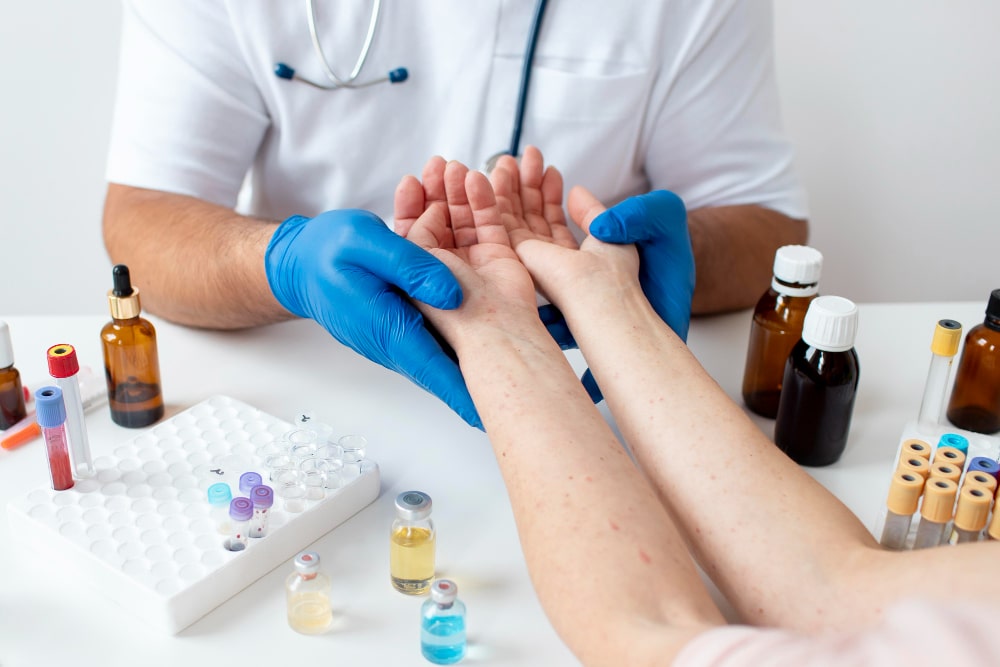Eczema, also known as atopic dermatitis, is a chronic skin disorder that causes inflamed, itchy, and red skin. It can affect people of all ages but is particularly common in children. This condition is characterized by periodic flare-ups where the symptoms worsen. It’s a manifestation of an internal imbalance, often rooted in an overactive immune system responding to various internal and external triggers. The skin, our largest organ, becomes a canvas depicting the silent turmoil unfolding within, rendering the affected individuals vulnerable, not just physically but emotionally. In this article we delve into the intricacies of this condition, illuminating its complexities.
Risk Factors
Certain factors increase the likelihood of developing eczema. Genetic predisposition plays a significant role; individuals with a family history of eczema or other allergic conditions like asthma or hay fever are at a heightened risk. Environmental aspects, including exposure to allergens, irritants, and extreme weather conditions, can also precipitate the onset of this skin condition.
Underlying Causes
Though the exact cause of eczema is unknown, it is believed to involve a combination of genetic and environmental factors. For discussions on their specific case, individuals can seek an online dermatologist consultation on Consultdoc platform to facilitate quick, localized, and professional advice within a few clicks.
Genetic Predisposition:
A family history of allergic conditions can be a significant indicator. Genetics often influence the body’s immune response, making some individuals more susceptible to skin irritations and allergies.
Environmental Factors:
External elements like pollen, pet dander, or specific food items can trigger reactions. Identifying these factors is essential for personalized management and prevention approaches.
Skin Barrier Defects:
Issues in the skin’s ability to retain moisture and act as a barrier to allergens and irritants can exacerbate the condition, leading to dryness and irritation.
Identifying Symptoms
Symptoms of eczema can vary widely. It’s essential to identify and understand these symptoms for effective management and treatment.
Itchiness:
One of the most distressing symptoms is an intense itchiness that can be relentless, leading to disrupted sleep and significant discomfort. Scratching provides momentary relief but exacerbates the inflammation.
Red and Inflamed Skin:
The affected skin areas become red, inflamed, and sensitive. These visible symptoms can lead to self-consciousness, affecting individuals’ social interactions and mental well-being.
Dry, Scaly Patches:
Eczema often presents as dry, scaly patches on the skin, especially during flare-ups. These areas can become rough and leathery, a result of persistent scratching and irritation.
Blisters and Oozing:
In severe cases, blisters filled with fluid may appear. When these blisters burst, they can ooze liquid and form crusts, increasing the risk of infection if not properly care for. Access to online GP services through Consultdoc can be invaluable in such instances, offering immediate advice on cleaning and caring for the affected areas to minimize infection risk.
Diagnostic Procedures
The process to diagnose this skin condition is thorough and patient-specific. A healthcare professional examines the affected skin areas, assessing the degree and pattern of redness, dryness, and scaling. The patient’s medical and family history plays a crucial role in understanding the possible genetic predisposition or underlying health concerns. Allergy testing becomes instrumental in pinpointing specific allergens or irritants, offering insights that pave the way for targeted, effective management strategies to alleviate discomfort and prevent future flare-ups.
Treatment Adaptations
Treatments for children are often adapted to be gentler and tailored to their specific needs and triggers. Leveraging online dermatologist consultation through Consuldoc can facilitate a quicker and more convenient exchange of information, aiding in the swift adaptation of treatment plans.
Topical Treatments:
Creams and ointments infused with steroids or other anti-inflammatory agents provide relief by reducing skin inflammation and irritation. For patients seeking additional assurance or clarification on the applications, an online doctor consultation on Consultdoc can help to manage and alleviate symptoms effectively.
Oral Medications:
In some instances, oral drugs, such as antihistamines or corticosteroids, are prescribed to control inflammation and itching. They work systemically, addressing internal factors contributing to skin discomfort.
Phototherapy:
Exposing the affected skin to specific ultraviolet light wavelengths under medical supervision can alleviate symptoms. This therapy can reduce inflammation, increase infection resistance, and promote healing.
Lifestyle Adjustments:
Adapting one’s lifestyle is integral in managing this skin condition. With GP near me service on Consultdoc, patients can receive personalized advice on avoiding irritants, dietary changes, and skincare routines from professionals, ensuring that lifestyle adjustments are both effective and helpful.
Preventive Measures
Identifying and avoiding triggers is a key preventive measure. A consistent skincare routine using mild cleansers and regular moisturizing helps maintain skin health. Avoiding allergens and irritants, and making lifestyle and environmental changes, can reduce flare-ups. Proper climate control, like maintaining optimal humidity and avoiding extreme temperatures, aids in skin protection. Each preventive measure is tailored to individual needs, considering their specific sensitivities and environmental factors.
Conclusion
Eczema is a multifaceted condition requiring personalized approaches to management and treatment. Understanding the types, triggers, and appropriate preventive and management strategies can significantly enhance the quality of life for individuals affected by this chronic skin disorder. By staying informed and proactive, individuals can navigate through the daily challenges and minimize the impact on their everyday lives. Advances in treatment options continue to bring hope, offering more effective solutions and support for those affected, ensuring that each person’s unique needs are met with care and precision.
